Mounting evidence shows food security has dwindled during the pandemic, especially for the most marginalised. Without urgent action, a year of famines looks increasingly likely in 2021. We must harness the power of volunteering for development to provide urgent relief and build more resilient livelihoods fit for the future.
It is World Food Day and the pandemic rumbles on. For many, coronavirus is an even greater crisis for livelihoods than it is for health. We know this because this is exactly what the people at the heart of VSO programmes – those we call our ‘primary actors’ – have been telling us.
Around the world, people’s ability to make a living has been severely disrupted. Whether due to restrictive social measures designed to stop the spread of the virus, disruptions to supply chains or huge hikes in food prices, many more people will be going to bed hungry tonight than were this time last year. The UN has warned that by the end of this year, 130 million more people will be living with hunger because of COVID-19.
COVID-induced hunger
The numbers are stark, even during the early phase of the pandemic:
- Up to half our primary actors have been forced to reduce their food intake as a result of the COVID-19 crisis and resulting restrictions
- Nearly a third have resorted to negative coping strategies to survive (such as selling off livestock)
- 62% lack adequate money to buy food or basic supplies.
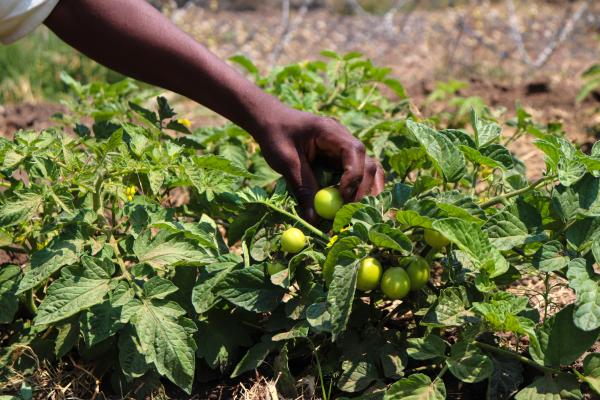
These bleak statistics are the result of two in-depth surveys conducted by VSO, which consulted more than 6,000 primary actors in 12 countries. It’s clear that food is the biggest immediate need in the communities where we work.
Unsurprisingly, the most marginalised communities – those who were already more likely to be food insecure before the pandemic – are facing the most acute food shortages. For example, a third of people living in refugee camps in north-western Uganda who responded to the survey said lack of money for food and essentials was “severely challenging”.
Lockdown in Rhino refugee camp
Over 100,000 people live in Rhino refugee camp in Arua, Uganda, having fled conflicts in South Sudan and elsewhere. From March, the camp was locked down to prevent the spread of the virus. With no one allowed in or out of the camp, there was an immediate pressure on food supply.
Sully* lives in the camp with her husband and their children. Both parents are living with HIV and taking antiretroviral medication. With the lockdown, their monthly food support ration began to be disrupted and their health began to be badly affected. Sully explains:
“You see the problem with this sickness [HIV] is that in even a short time without good food [nutrition], your whole body deteriorates very quickly. I had very little money that could use to buy the food I needed, and I had started developing rashes again.”
A VSO volunteer-coordinated effort has provided cash assistance to Sully and 2,500 other refugees in the camp, targeting the elderly, disabled and people with existing health conditions. VSO volunteers have played a critical role in providing urgent food support to marginalised groups, for example to fisherfolk in Philippines and to ex-inmates in Zimbabwe, identifying those at greatest need and connecting people to services where these exist. But much more concerted action is needed.
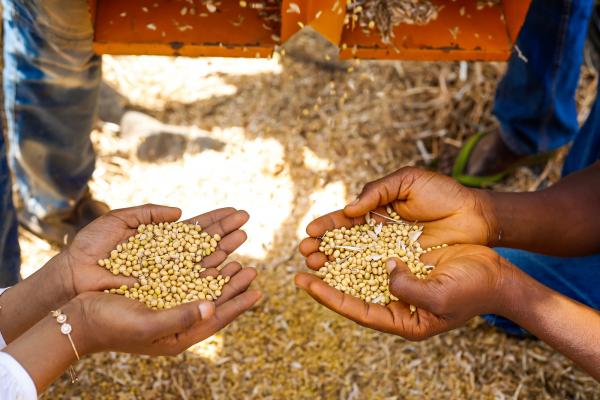
Almost all our primary actors received no government assistance to help them through COVID-induced hardship, which has added to the already mounting pressures of the climate crisis on livelihoods and food security. Governments must expand their social protection programmes in light of the COVID-19 crisis.
Existential threat
COVID-induced hunger is a real threat to our progress. For VSO, working as we do through a volunteering for development model that harnesses the efforts of local community members as well as professional experts, we have seen the huge outpouring of solidarity throughout this crisis. Our work is about creating change from within, and we’ve continued to work throughout this crisis, with over 90% of VSO community volunteers continuing their activities throughout this period.
During the first phase of the pandemic, our primary actors showed marked resilience. We saw evidence that thanks to our long-term volunteering interventions, primary actors were able to draw upon savings and networks to make it through the economic shock of COVID-19. This has been necessary since a majority live in countries without adequate social safety nets such as those enjoyed in richer countries like the UK. But this has become a long crisis and hunger is mounting. Even the community volunteers who are the engine of VSO’s work are experiencing hunger and hardship.
We must heed the warnings of the data: urgent action is needed or this COVID-induced food crisis risks becoming a famine. The hardships already experienced by millions will be just the tip of the iceberg.
Taking action
We need concerted action locally, nationally, and globally.

In the short-term, urgent action is needed in terms of food and cash assistance to the most marginalised communities, women and other groups around the world. There is an opportunity to ensure any food purchased is from local smallholder farmers to support their livelihoods and revive local economies. Smallholder farmers, processors and traders need support – including financial assistance for them to continue farming and getting their goods to the market.
But beyond that, we need to build a more food secure future for the long term. COVID-19 is a wakeup call. It is time to invest in local, resilient farming, as well as resilient livelihoods that will bear the test of time, and support the shift to a green, gender-just economy.
Policy makers need to take young people along – creating an enabling environment for their participation in the productive sector and decent employment, in rebuilding our societies, preserving our environment, and building sustainable local economies.
How can we achieve all of this?
To create the inclusive, resilient and accountable societies that can build a food secure future, we need to harness our biggest asset: people. As a global volunteering for development organisation, VSO has extensively evidenced the impacts possible when local community volunteering is harnessed alongside the in-puts of technical expert volunteers, including e-volunteers.
Our primary actors have told us they need time and support to get back on their feet. In our surveys, we see their desire to acquire new skills, and to develop new income generating activities. This makes sense – 2020 has been a stark demonstration of the importance of being able to be adaptable and resilient in the face of shocks and upheaval. When COVID-19 hit and markets shrank or became volatile, very few had other options for earning a livelihood.
We have an opportunity now to shape policy to create more accessible and inclusive social safety nets for the most vulnerable people, as well as more resilient food systems.
The spirit of solidarity that has been seen throughout 2020 as communities came together to fight the immense challenges of the pandemic must be bolstered and harnessed as a methodology for sustainable change.
Read more
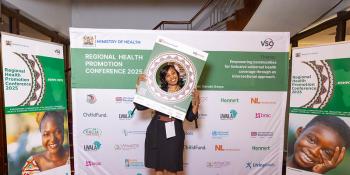
In photos: Our Regional Health Promotion Conference 2025
Check out some of our favourite photos from Regional Health Promotion Conference (RHPC25). This event sought to reimagine Universal Health Coverage through the lens of intersectionality.
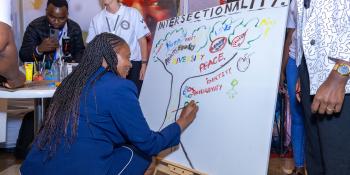
Using intersectionality to create healthy beginnings and hopeful futures
World Health Day brings global attention to the urgent need to end preventable maternal and newborn deaths. Learn more about how our Regional Health Promotion Conference is tackling these issues head on.
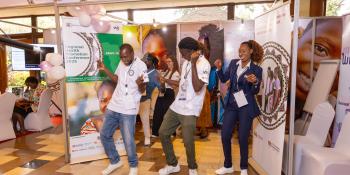
Highlights from the Regional Health Promotion Conference 2025
The Regional Health Promotion Conference 2025 reimagined Universal Health Coverage (UHC) through the lens of intersectionality, by bringing together experts from across East Africa and beyond.
